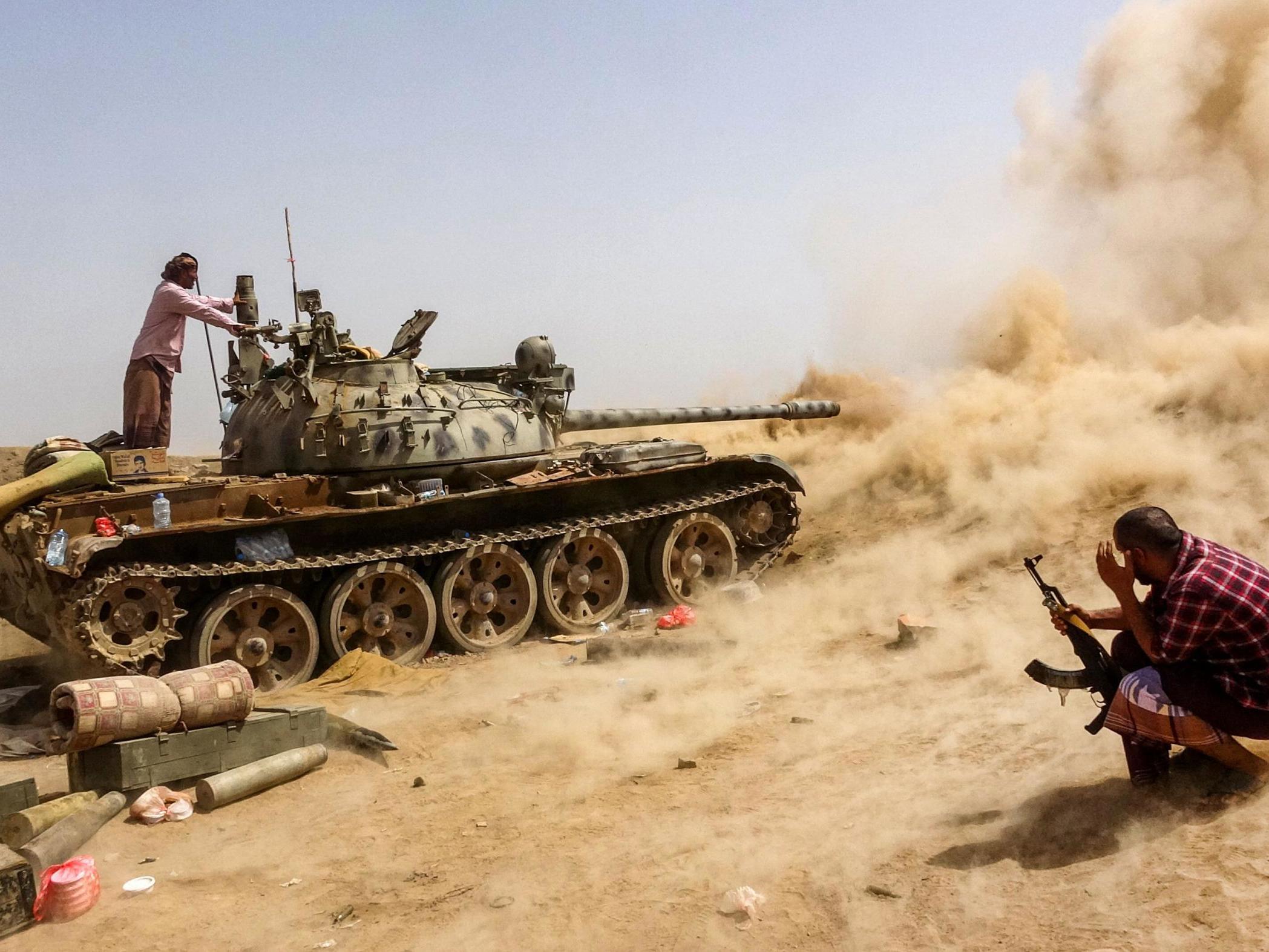Houthi rebels fire missile at Saudi capital amid surge in fighting across Yemen
UK calls for end to violence to allow access for UN humanitarian mission

Your support helps us to tell the story
From reproductive rights to climate change to Big Tech, The Independent is on the ground when the story is developing. Whether it's investigating the financials of Elon Musk's pro-Trump PAC or producing our latest documentary, 'The A Word', which shines a light on the American women fighting for reproductive rights, we know how important it is to parse out the facts from the messaging.
At such a critical moment in US history, we need reporters on the ground. Your donation allows us to keep sending journalists to speak to both sides of the story.
The Independent is trusted by Americans across the entire political spectrum. And unlike many other quality news outlets, we choose not to lock Americans out of our reporting and analysis with paywalls. We believe quality journalism should be available to everyone, paid for by those who can afford it.
Your support makes all the difference.Yemen’s Houthi rebels fired a volley of missiles at Saudi Arabia on Tuesday with one reaching as far as the Saudi capital, as violence flared across the country following the expiry last month of a ceasefire brokered during the coronavirus pandemic.
Two large explosions sounded above Riyadh at dawn, while smoke billowed into the sky during the barrage, which the Houthis claimed had “pounded” the Saudi defence ministry and a military base.
The Saudi-led military coalition, which has fought the Iran-backed Houthis for more than five years in support of Yemen’s recognised government, said it had shot down one missile, but made no reference to targets. The coalition also said it shot down three missiles headed towards Najran and Jizan along with a number of drones.
Dominic Raab, the UK foreign secretary, condemned the attacks, saying they “cast further doubt on [Houthi] claims to want peace”.
Violence has soared in Yemen since the expiry of a six-week ceasefire, which was prompted by the Covid-19 pandemic, between Gulf-backed government forces and the Houthis.
The Houthis have repeatedly fired on Saudi Arabia during the conflict, but they had not targeted Riyadh since late March, when Saudi Arabia said it shot down a missile and two residents were injured by falling debris in the capital.
Houthi military spokesperson Yahya Sarea said in a televised speech that on Tuesday the group had fired several missiles and drones targeting military headquarters and centres in Riyadh, including the defence ministry and King Salman airbase. Attacks were also launched against military sites in the southern Saudi cities of Najran and Jizan, the Houthis said.
Colonel Turki al-Malki, a spokesperson for the Saudi-led coalition, called the attack on Riyadh a “deliberate hostile action designed to target civilians”.
Mr Raab said that, with more than 1 million Yemenis believed to have contracted the coronavirus, it was now “more vital than ever that the Houthis cease their hostilities and allow the UN-led humanitarian response to get on with saving Yemeni lives”.
Fighting has also erupted in the south of Yemen involving anti-Houthi factions once allied to the Gulf coalition, further deepening the country’s woes.
Medical charity Doctors Without Borders said its trauma hospital in the southern port of Aden received more than 20 patients on Tuesday, injured during shelling in nearby Abyan province where clashes were ongoing between forces of the recognised government and its one-time ally, the southern separatists.
Riyadh tried to broker a truce between the two sides on Monday after southern separatists seized control of Yemen’s remote Socotra island over the weekend. After losing control, the Saudi-backed government condemned the action as a coup.
The Southern Transitional Council (STC), which declared self-rule in that part of Yemen in April, announced it had seized government facilities and military bases on the sparsely populated archipelago. Nicknamed the Galapagos of the Indian Ocean, Socotra sits at the mouth of the Gulf of Aden on one of the world’s busiest shipping lanes.
The government, which is led by the president, Abedrabbo Mansour Hadi, condemned the action as a “full-fledged” coup and accused STC forces of attacking government buildings in “gang-style behaviour”.
Socotra’s governor, Ramzi Mahroos, meanwhile accused coalition leaders Saudi Arabia and the United Arab Emirates of turning a blind eye.
Members of the STC defended their actions, telling The Independent that it was government forces that had violated the ceasefire, in what they claimed was “an irresponsible escalation”.
Tribesmen in the neighbouring mainland province of Mahra, who are opposed to the separatist movement, said the STC and its Abu Dhabi backers were “implementing their mission” to sweep the south of the country.
Sources told Reuters that the STC had denied receiving Riyadh’s attempted truce agreement. Saudi Arabia wants to prevent yet another fracture in Yemen’s increasingly complex war, which has been locked in military deadlock for years.
With only half the country’s health facilities still functioning, the country had already limped through the worst outbreak of cholera in modern history, before being hit by Covid-19.
Yemen has been ripped apart by fighting since late 2014 when the Houthi rebels seized control of the capital Sana’a, forcing the recognised government to flee.
Fearing Iran’s encroachment in the region, Saudi Arabia and Abu Dhabi launched a bombing campaign to reinstate President Hadi in March 2015. Five years on, there is little hope of an end to a conflict that has killed more than 100,000 people and sparked what the UN calls the world’s worst humanitarian crisis.
Join our commenting forum
Join thought-provoking conversations, follow other Independent readers and see their replies
Comments